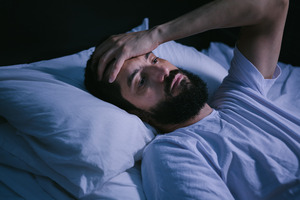
Sleep apnea is associated with all kinds of health issues, such as heart attacks and strokes. But did you know it could even have an impact on the rate that your body ages? Researchers have found evidence that sleep apnea could potentially speed up biological aging if it remains untreated; your dentist is here to explain why this might happen as well as what you can do to improve your health and get a good night’s sleep again.
What is Sleep Apnea?
Sleep apnea is a common sleep disorder that is often the result of the airway being partially or completely obstructed by collapsed tissues in the mouth or throat. These obstructions can cause your breathing to repeatedly stop and restart while you’re asleep; depending on the severity of the disorder, this could happen as many as 30 times in a single hour.
When your breathing pauses, the oxygen levels in your blood decrease. Your body may be forced to briefly awaken in an effort to restart breathing; if these awakenings keep happening, they can make it extremely difficult to get quality sleep.
How Can Sleep Apnea Affect the Aging Process?
A study published by the American Academy of Sleep Medicine looked at the possible relationship between biological aging and sleep apnea. Your biological age is effectively a measure of how well your body is functioning relative to your chronological age. The results of the study indicated that not only was sleep apnea associated with faster biological aging, but the severity of the disorder affected how much of an impact it had.
There is good news, however. Additional research shows that properly treating sleep apnea can also help stop and even reverse sped-up biological aging. Naturally, this is just one more reason why you should seek professional care as soon as you have reason to suspect that you may have developed sleep apnea.
What Can You Do to Treat Sleep Apnea?
One way to treat sleep apnea is to use a CPAP machine. This device can deliver a steady stream of pressurized air down your throat via a special mask, thus keeping your airways unobstructed while you sleep. But while CPAP is considered the gold standard for treating sleep apnea, it’s not for everyone; some patients have a hard time falling asleep due to the noise of the machine, and others find that the mask is too uncomfortable.
Fortunately, some dentists are able to provide their patients with customized oral appliances as an alternative to CPAP. An oral appliance can help you maintain a clear airway during the night by moving the lower jaw forward or holding the tongue in place. Many people find this to be the more comfortable option, and it’s also more convenient for traveling.
If you want to avoid accelerated biological aging and other serious consequences of sleep-disordered breathing, then you should act quickly to ensure that your sleep apnea is properly treated. Reach out to an expert today to find out how you can have your sleep disorder diagnosed.
About the Author
Dr. Rashpal Deol holds membership with the American Board of Dental Sleep Medicine as well as various other organizations. He is working on achieving Mastery status with the American Academy of Dental Sleep Medicine. He offers oral appliance treatment for patients who are suffering from sleep apnea. To schedule a consultation with Dr. Deol at Oak Ridge Dental in San Ramon, visit his website or call (925) 735-6190.




